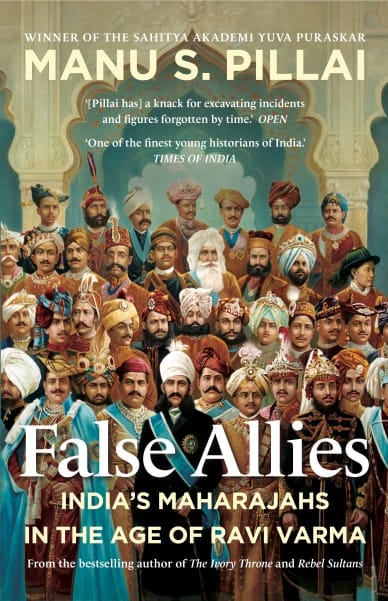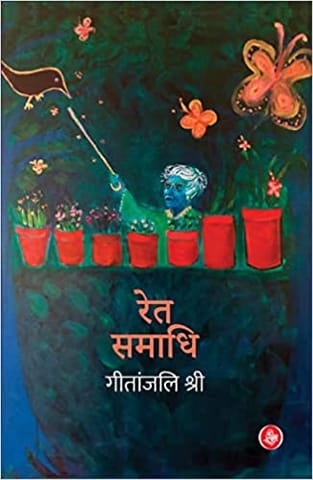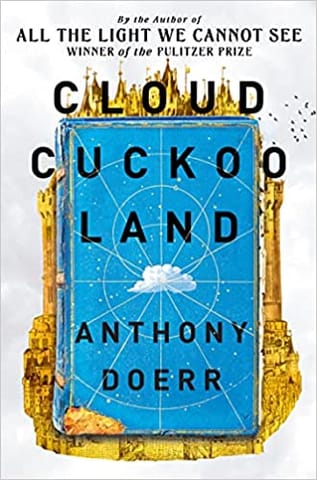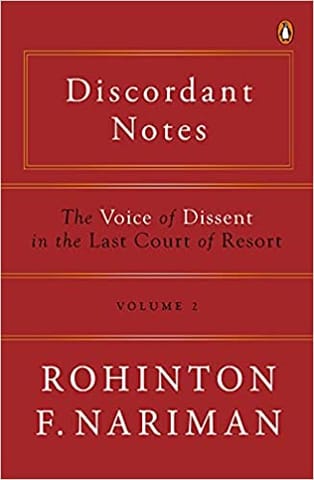-
Non-ficton
- Non-ficton
-
Contemporary Fiction
- Contemporary Fiction
-
Children
- Children
-
Comics & Graphic Novels
- Comics & Graphic Novels
-
Non-Fiction
- Non-Fiction
-
Fiction
- Fiction
FALSE ALLIES: INDIA’S MAHARAJAHS IN THE AGE OF RAVI VARMA
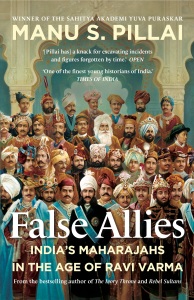
India’s maharajahs have traditionally been cast as petty despots, consumed by lust and luxury. Bejewelled parasites, they cared more, we are told, for elephants and palaces than for schools and public works. The British cheerfully circulated the idea that brown royalty needed ‘enlightened’ white hands to guide it, and by the twentieth century many Indians too bought into the stereotype, viewing princely India as packed with imperial stooges. Indeed, even today the princes are either remembered with frothy nostalgia or dismissed as greedy fools, with no role in the making of contemporary India.
In this brilliantly researched book, Manu S. Pillai disputes this view. Tracking the travels of the iconic painter Ravi Varma through five princely states – from the 1860s to the early 1900s – he uncovers a picture far removed from the clichés in which the princes are trapped. The world we discover is not of dancing girls, but of sedition, legal battles, the defiance of imperial dictates, and resistance. We meet maharajahs obsessed with industrialization, and rulers who funded nationalists, these men anything but pushovers for the Raj to manipulate. Outward deference aside, the princes, Pillai shows, forever tested the Raj – from denying white officials the right to wear shoes in durbars to trying to surpass British administrative standards. Good governance became a spectacularly subversive act, by which maharajahs and the ‘native statesmen’ assisting them refuted claims that Indians could not rule themselves. For decades this made the princes heroes in the eyes of nationalists and anti-colonial thinkers – a facet of history we have forgotten and ignored.
By refocusing attention on princely India, False Allies takes us on an unforgettable journey and reminds us that the maharajahs were serious political actors – essential to knowing modern India.
ADVANCE PRAISE
“Manu S. Pillai has once again given us an enthralling look into a neglected realm of Indian history. False Allies is at once lucid and accessible, all the while maintaining deep scholarly rigor . . . With the erudition that we’ve come to expect from his books, Pillai navigates the world of colonial Indian kingship and puts on display the complex and diverse personalities of the princes . . . and their interactions with their subjects and their colonizers, demonstrating that the period and its actors were far from monolithic. The result is a refreshing work that reframes the Indian princely states as both harbingers of tradition and agents of change, and demands we give them their due for their role in shaping modernity. False Allies is certainly a masterpiece of historical writing.”- Caleb Simmons, author of Devotional Sovereignty: Kingship and Religion in India (2020)
“Manu S. Pillai has done the double. He’s written a book that general readers will relish and scholars will respect. Using the life and paintings of Ravi Varma, India’s most famous artist of his time, Pillai re-examines some of India’s princely states and their rulers ‒ its maharajas. Through admirable research, he discovers skilful modernizers and deft political operators, struggling to keep the British at a distance and “modernize” in ways acceptable to themselves and their subjects. This cleverly crafted book will delight general readers and lead scholars to re-think ideas about the India of the 19th and early 20th centuries.”- Robin Jeffrey, editor of People, Princes and Paramount Power: Society and Politics in the Indian Princely States (1978)
“False Allies is a monumental achievement. Its sensitive portraits of India’s princes rescue these long misunderstood figures from caricature and myth. By revealing how artfully India’s princes addressed the challenges posed by colonialism and modernity, Manu S. Pillai makes them at once more human and more grand, and thereby grants them a more fitting place in our collective imagination. Learned, erudite, and wide-ranging, False Allies is a landmark contribution to our understanding of modern India.”- Rahul Sagar, author of The Dewan: Raja Sir Tanjore Madhava Rao and the Making of Modern India (forthcoming) and editor of The Progressive Maharaja: Sir Madhava Rao’s Hints on the Art and Science of Government (2021)
“Manu Pillai proves once again why he is one of India’s most popular writers of historical nonfiction. Taking the work of master artist Raja Ravi Varma as inspiration, Pillai here paints his own luminous portrait of some of the colonial subcontinent’s most significant and flamboyant royals. With scholarly command, a meticulous eye for detail, and a sense of the dramatic, he mingles light and shadow to add rich texture to the region’s much maligned maharajahs, revealing complex characters who sometimes managed through perspicacity and perseverance to challenge the might of the British Empire and usher in new, progressive ideas of a modern nation.”- Manu Bhagavan, author of Sovereign Spheres: Princes, Education and Empire in Colonial India (2003)
About the Author


- Home
- Best Sellers
- FALSE ALLIES : India’s Maharajahs in the Age of Ravi Varma
FALSE ALLIES : India’s Maharajahs in the Age of Ravi Varma
SIZE GUIDE
- ISBN: 9789391165895
- Author: Pillai Manu S
- Publisher: Juggernaut
- Pages: 568
- Format: Hardback
Book Description
FALSE ALLIES: INDIA’S MAHARAJAHS IN THE AGE OF RAVI VARMA

India’s maharajahs have traditionally been cast as petty despots, consumed by lust and luxury. Bejewelled parasites, they cared more, we are told, for elephants and palaces than for schools and public works. The British cheerfully circulated the idea that brown royalty needed ‘enlightened’ white hands to guide it, and by the twentieth century many Indians too bought into the stereotype, viewing princely India as packed with imperial stooges. Indeed, even today the princes are either remembered with frothy nostalgia or dismissed as greedy fools, with no role in the making of contemporary India.
In this brilliantly researched book, Manu S. Pillai disputes this view. Tracking the travels of the iconic painter Ravi Varma through five princely states – from the 1860s to the early 1900s – he uncovers a picture far removed from the clichés in which the princes are trapped. The world we discover is not of dancing girls, but of sedition, legal battles, the defiance of imperial dictates, and resistance. We meet maharajahs obsessed with industrialization, and rulers who funded nationalists, these men anything but pushovers for the Raj to manipulate. Outward deference aside, the princes, Pillai shows, forever tested the Raj – from denying white officials the right to wear shoes in durbars to trying to surpass British administrative standards. Good governance became a spectacularly subversive act, by which maharajahs and the ‘native statesmen’ assisting them refuted claims that Indians could not rule themselves. For decades this made the princes heroes in the eyes of nationalists and anti-colonial thinkers – a facet of history we have forgotten and ignored.
By refocusing attention on princely India, False Allies takes us on an unforgettable journey and reminds us that the maharajahs were serious political actors – essential to knowing modern India.
ADVANCE PRAISE
“Manu S. Pillai has once again given us an enthralling look into a neglected realm of Indian history. False Allies is at once lucid and accessible, all the while maintaining deep scholarly rigor . . . With the erudition that we’ve come to expect from his books, Pillai navigates the world of colonial Indian kingship and puts on display the complex and diverse personalities of the princes . . . and their interactions with their subjects and their colonizers, demonstrating that the period and its actors were far from monolithic. The result is a refreshing work that reframes the Indian princely states as both harbingers of tradition and agents of change, and demands we give them their due for their role in shaping modernity. False Allies is certainly a masterpiece of historical writing.”- Caleb Simmons, author of Devotional Sovereignty: Kingship and Religion in India (2020)
“Manu S. Pillai has done the double. He’s written a book that general readers will relish and scholars will respect. Using the life and paintings of Ravi Varma, India’s most famous artist of his time, Pillai re-examines some of India’s princely states and their rulers ‒ its maharajas. Through admirable research, he discovers skilful modernizers and deft political operators, struggling to keep the British at a distance and “modernize” in ways acceptable to themselves and their subjects. This cleverly crafted book will delight general readers and lead scholars to re-think ideas about the India of the 19th and early 20th centuries.”- Robin Jeffrey, editor of People, Princes and Paramount Power: Society and Politics in the Indian Princely States (1978)
“False Allies is a monumental achievement. Its sensitive portraits of India’s princes rescue these long misunderstood figures from caricature and myth. By revealing how artfully India’s princes addressed the challenges posed by colonialism and modernity, Manu S. Pillai makes them at once more human and more grand, and thereby grants them a more fitting place in our collective imagination. Learned, erudite, and wide-ranging, False Allies is a landmark contribution to our understanding of modern India.”- Rahul Sagar, author of The Dewan: Raja Sir Tanjore Madhava Rao and the Making of Modern India (forthcoming) and editor of The Progressive Maharaja: Sir Madhava Rao’s Hints on the Art and Science of Government (2021)
“Manu Pillai proves once again why he is one of India’s most popular writers of historical nonfiction. Taking the work of master artist Raja Ravi Varma as inspiration, Pillai here paints his own luminous portrait of some of the colonial subcontinent’s most significant and flamboyant royals. With scholarly command, a meticulous eye for detail, and a sense of the dramatic, he mingles light and shadow to add rich texture to the region’s much maligned maharajahs, revealing complex characters who sometimes managed through perspicacity and perseverance to challenge the might of the British Empire and usher in new, progressive ideas of a modern nation.”- Manu Bhagavan, author of Sovereign Spheres: Princes, Education and Empire in Colonial India (2003)
About the Author


User reviews
NEWSLETTER
Subscribe to get Email Updates!
Thanks for subscribing.
Your response has been recorded.

India's Iconic & Independent Book Store offering a vast selection of books across a variety of genres Since 1978.
"We Believe In The Power of Books" Our mission is to make books accessible to everyone, and to cultivate a culture of reading and learning. We strive to provide a wide range of books, from classic literature, sci-fi and fantasy, to graphic novels, biographies and self-help books, so that everyone can find something to read.
Whether you’re looking for your next great read, a gift for someone special, or just browsing, Midland is here to make your book-buying experience easy and enjoyable.
We are shipping pan India and across the world.
For Bulk Order / Corporate Gifting
 +91 9818282497 |
+91 9818282497 |  [email protected]
[email protected]
Click To Know More
INFORMATION
POLICIES
ACCOUNT
QUICK LINKS
ADDRESS
Shop No.20, Aurobindo Palace Market, Near Church, New Delhi

